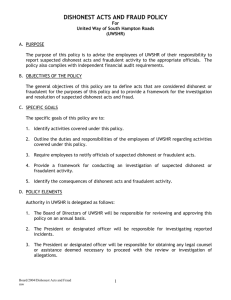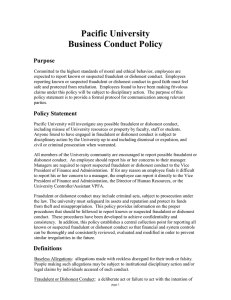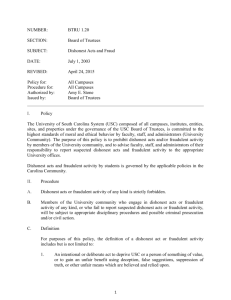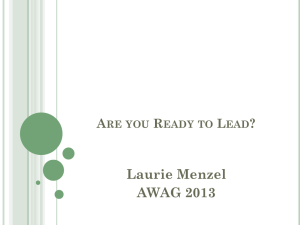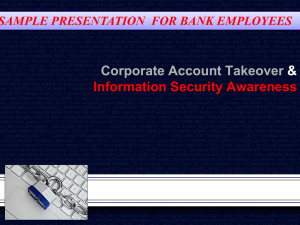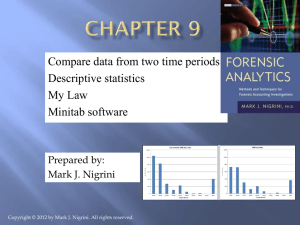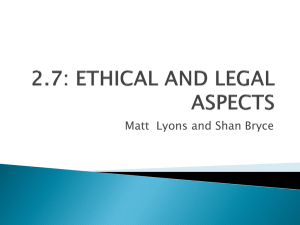Employee Protection/Code of Conduct Policy - E
advertisement
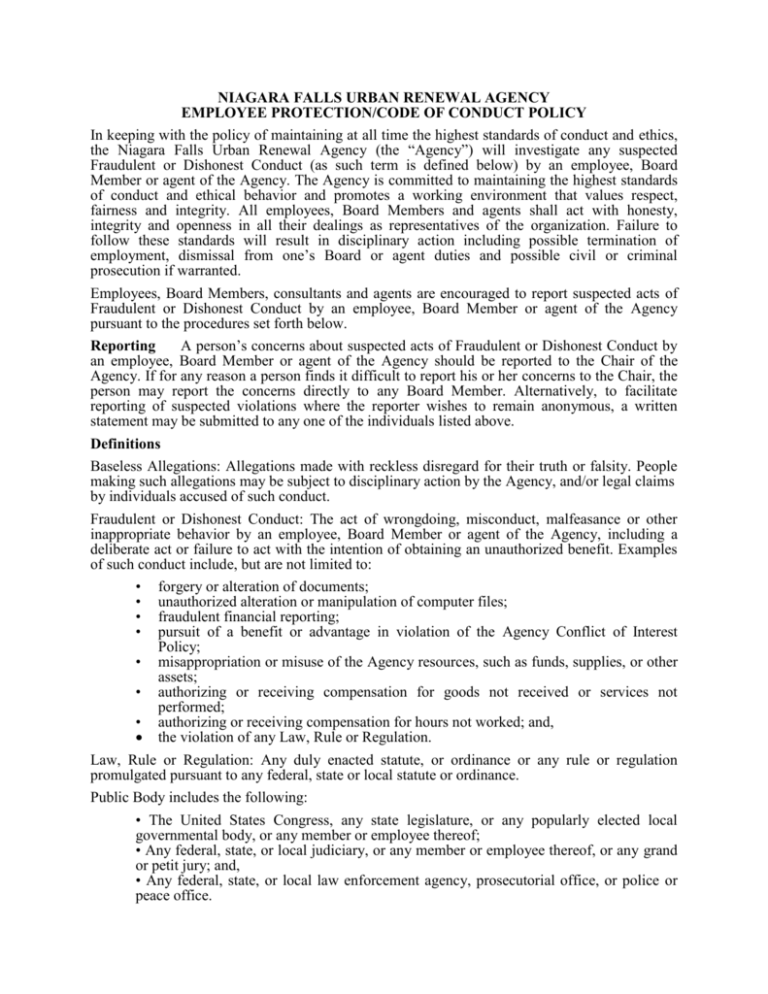
NIAGARA FALLS URBAN RENEWAL AGENCY EMPLOYEE PROTECTION/CODE OF CONDUCT POLICY In keeping with the policy of maintaining at all time the highest standards of conduct and ethics, the Niagara Falls Urban Renewal Agency (the “Agency”) will investigate any suspected Fraudulent or Dishonest Conduct (as such term is defined below) by an employee, Board Member or agent of the Agency. The Agency is committed to maintaining the highest standards of conduct and ethical behavior and promotes a working environment that values respect, fairness and integrity. All employees, Board Members and agents shall act with honesty, integrity and openness in all their dealings as representatives of the organization. Failure to follow these standards will result in disciplinary action including possible termination of employment, dismissal from one’s Board or agent duties and possible civil or criminal prosecution if warranted. Employees, Board Members, consultants and agents are encouraged to report suspected acts of Fraudulent or Dishonest Conduct by an employee, Board Member or agent of the Agency pursuant to the procedures set forth below. Reporting A person’s concerns about suspected acts of Fraudulent or Dishonest Conduct by an employee, Board Member or agent of the Agency should be reported to the Chair of the Agency. If for any reason a person finds it difficult to report his or her concerns to the Chair, the person may report the concerns directly to any Board Member. Alternatively, to facilitate reporting of suspected violations where the reporter wishes to remain anonymous, a written statement may be submitted to any one of the individuals listed above. Definitions Baseless Allegations: Allegations made with reckless disregard for their truth or falsity. People making such allegations may be subject to disciplinary action by the Agency, and/or legal claims by individuals accused of such conduct. Fraudulent or Dishonest Conduct: The act of wrongdoing, misconduct, malfeasance or other inappropriate behavior by an employee, Board Member or agent of the Agency, including a deliberate act or failure to act with the intention of obtaining an unauthorized benefit. Examples of such conduct include, but are not limited to: • forgery or alteration of documents; • unauthorized alteration or manipulation of computer files; • fraudulent financial reporting; • pursuit of a benefit or advantage in violation of the Agency Conflict of Interest Policy; • misappropriation or misuse of the Agency resources, such as funds, supplies, or other assets; • authorizing or receiving compensation for goods not received or services not performed; • authorizing or receiving compensation for hours not worked; and, the violation of any Law, Rule or Regulation. Law, Rule or Regulation: Any duly enacted statute, or ordinance or any rule or regulation promulgated pursuant to any federal, state or local statute or ordinance. Public Body includes the following: • The United States Congress, any state legislature, or any popularly elected local governmental body, or any member or employee thereof; • Any federal, state, or local judiciary, or any member or employee thereof, or any grand or petit jury; and, • Any federal, state, or local law enforcement agency, prosecutorial office, or police or peace office. Retaliatory Personnel Action: The discharge, suspension or demotion of an employee, or other adverse employment action taken against the employee in the terms and conditions of employment, including but not limited to, threats of physical harm, loss of job, punitive work assignments, or impact on salary or fees, arising from the employee’s actions as a WhistleBlower. Whistle-Blower: An employee, consultant or agent who informs an Officer, any Board Member, or Public Body pursuant to the provisions of this policy about an activity relating to the Agency which that person believes to be Fraudulent or Dishonest Conduct. Rights and Responsibilities The Chair of the Board of Directors of the Agency is required to investigate any allegation of Fraud or Dishonest Conduct. If Fraudulent or Dishonest Conduct is reported to a Board member, and the Conduct does not implicate the Chair, the Board Member must report the Fraud or Dishonest Conduct to the Chair. Otherwise, the Board Member may investigate the allegation, report the Conduct to the General Counsel for investigation or report the allegation to such official, such as the District Attorney, as may be responsible for investigating the allegation. Reasonable care should be taken in dealing with suspected Fraudulent or Dishonest Conduct to avoid: • Baseless Allegations; • premature notice to persons suspected of Fraudulent or Dishonest Conduct and/or disclosure of suspected Fraudulent or Dishonest Conduct to others not involved with the investigation; and • violations of a person’s rights under law. Due to the important yet sensitive nature of the suspected Fraudulent or Dishonest Conduct, effective professional follow-up is critical. The Board Chair of the Agency, while appropriately concerned about the vailidity of such issues, should not in any circumstances perform any investigative or other follow up steps on his or her own. Accordingly, when the Chair becomes aware of suspected Fraudulent or Dishonest Conduct he or she: • should not contact the person suspected of Fraudulent or Dishonest Conduct to further investigate the matter or demand restitution; • should not discuss the case with attorneys, the media or anyone other than the members of the Board; and • should not report the case to an authorized law enforcement officer without first discussing the case with the members of the Board. Investigation. All relevant matters, including suspected but unproved allegations of Fraudulent or Dishonest Conduct, will be reviewed and analyzed to the best of the Board Chair’s ability, with documentation of the receipt, retention, investigation and treatment of the complaint. Appropriate corrective action will be taken, if necessary, and findings will be communicated to the Board and back to the reporting person, if appropriate. Investigations may warrant investigation by an independent person such as auditors and/or attorneys. Allegations concerning violations of law will be referred to the District or U.S. Attorney for action. Whistle Blower Protection. The Agency will use its best efforts to protect Whistle-Blowers against all Retaliatory Personnel Actions. Whistle-Blowing complaints will be handled with sensitivity, discretion and confidentiality to the extent allowed by the circumstances and the law. Generally, this means that Whistle-Blower complaints will only be shared with those who have a need to know so that the Agency can conduct an effective investigation, determine what action to take based on the results of any such investigation, and in appropriate cases, with law enforcement personnel. Should disciplinary or legal action be taken against a person or persons as a result of a Whistle-Blower complaint, such persons may also have right to know the identity of the Whistle-Blower. Employees, Board Members, consultants and agents of the Agency may not engage in any Retaliatory Personnel Action against a Whistle-Blower for disclosing or threatening to disclose to the Chair, Board Member or other person, any activity which that person believes to be Fraudulent or Dishonest Conduct, or objecting to or refusing to participate in any Fraudulent or Dishonest Conduct. Whistle-Blowers who believe that they have been the victim of a Retaliatory Personnel Action may file a written complaint with the Board Chair or board member, as applicable. Any complaint of a Retaliatory Personnel Action will be promptly investigated and appropriate corrective measures taken if such allegations are substantiated. This protection from Retaliatory Personnel Action is not intended to prohibit supervisors from taking action, including disciplinary action, in the usual scope of their duties and based on valid performance-related factors. Employees, Board Members, consultants and agents of the Agency may not engage in any Retaliatory Personnel Action against a Whistle-Blower for disclosing, or threatening to disclose to a Public Body any activity which that person believes to be Fraudulent or Dishonest Conduct, or for providing information to, or testifying before, any Public Body conducting an investigation, hearing or inquiry into any such Fraudulent or Dishonest Conduct. However, a Whistle-Blower who discloses or threatens to disclose any Fraudulent or Dishonest Conduct to a Public Body is not covered under this policy unless he or she first brings the allegation of Fraudulent or Dishonest Conduct to the attention of the Board Chair or Board Member, as applicable, and has afforded the Agency a reasonable opportunity to correct and or remedy such Fraudulent or Dishonest Conduct and, the Whistle-Blowers have avoided Baseless Allegations.
